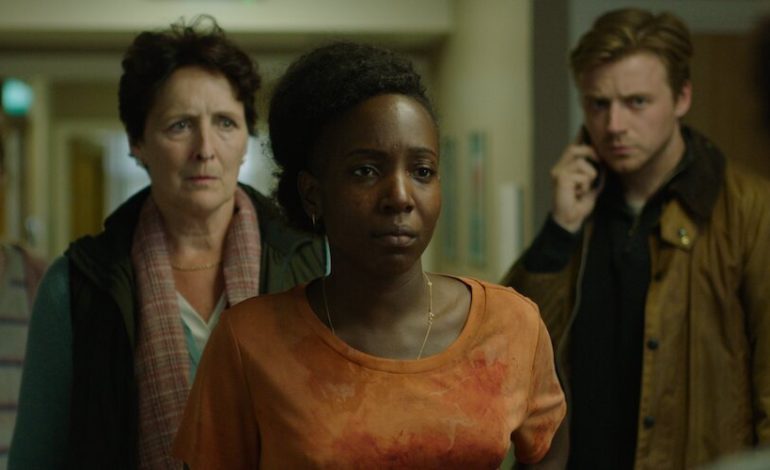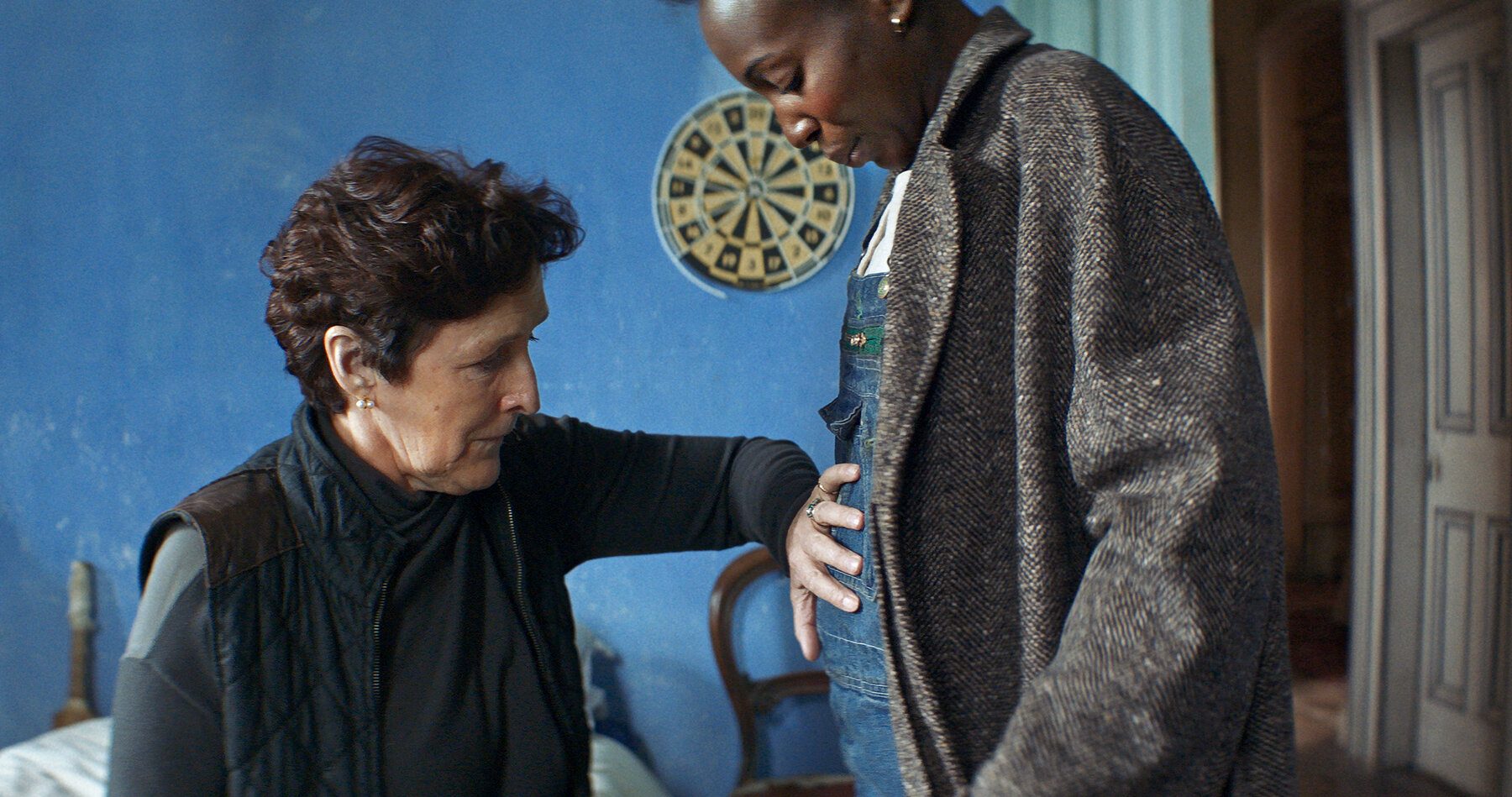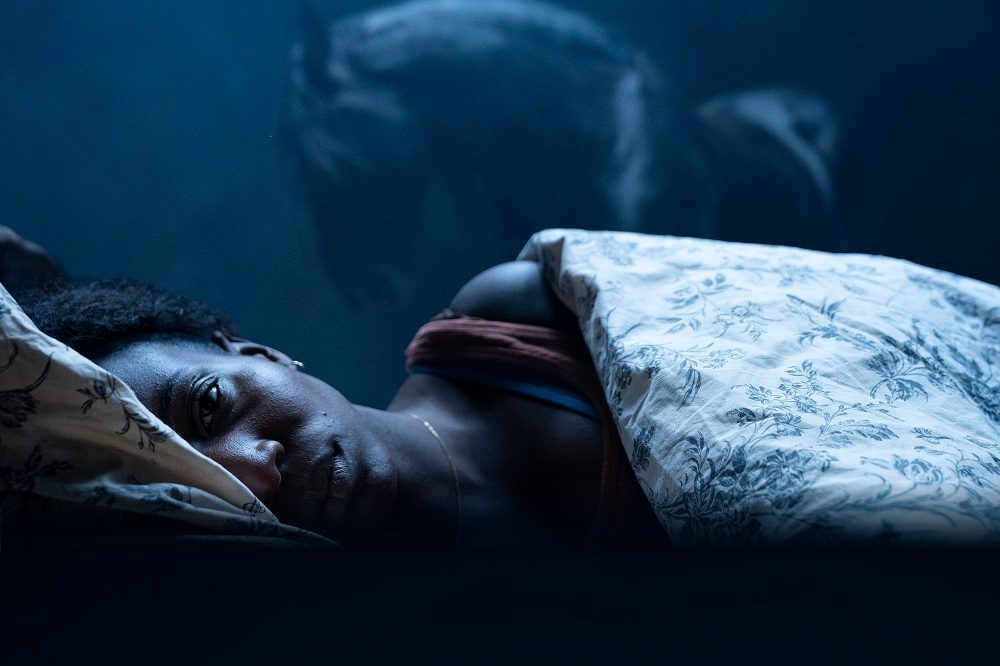

Some horror films seek to frighten their audiences with ghosts, demons, or other supernatural monsters. Others focus on the more everyday terror of serial killers and other real-world kinds of lunatics. Kindred, the new film from IFC Midnight, takes a very different approach. Instead of traumatizing audiences with fantastical villains or the most extreme versions of exaggerated human behavior, it revolves around a situation that is much more commonplace, and much more terrifying: an unexpected pregnancy and an overbearing mother. While that may not seem like particularly fertile ground for an effective horror story, in the hands of director and co-writer Joe Marcantonio, the results are as personal as they are disturbing.
Charlotte (Tamara Lawrence) and Ben (Edward Holcroft) are a cute, young couple living in a small cottage in England. They head over to meet Ben’s family for lunch at their palatial family estate, which is every bit as aggressively British as the family itself. Ben’s mother Margaret (Fiona Shaw) is a polite, austere, and bitingly passive-aggressive matriarch, and his step-brother Thomas (Jack Lowden) is pleasant, quiet, and oh so subtly creepy. Margaret is displeased when she finds out that the couple is planning to move to Australia, and Charlotte is even more displeased when she visits the family doctor and finds out that she is pregnant. Unsure if she wants a baby, Charlotte asks Dr. Richards (Anton Lesser) what her options are, and he responds by asking, “what are you suggesting?” before telling her to go home and discuss it with her boyfriend before making any rash decisions.


The situation gets further complicated when, on their next visit to the mansion, Ben dies in a tragic accident. The only thing that puts more of a damper on a weekend in the country than having your boyfriend get kicked to death by a horse is being forced to move in with his family afterwards. Margaret and Thomas offer to let Charlotte stay with them so that they can help take care of her and the baby in this difficult time. Charlotte, still uninterested in being a mother, does not appreciate the hospitality, especially when it becomes clear that the seemingly generous invitation is not optional. Without consulting her, Margaret and Thomas move Charlotte’s things into an empty wing, “accidentally” breaking her phone in the process. They continue to isolate her by locking the front gates and making her a prisoner in the house, all while offering pleasantly repressed British smiles and kind words of support. Over the next nine months, captivity gives way to gaslighting as Charlotte begins to experience blackouts and surrealistic dreams, while the family tells her that she’s not well and that they only have her best interests at heart. These best interests include drugging her tea, supervising her ultrasound appointments, and even spending the night in her bed.


The story can be taken as an allegory for abortion – a manipulative doctor shames a woman for considering her options, and her agency is slowly taken away by people who profess to have her best interest at heart, but don’t care about her at all. Some audiences might not consider Kindred to be a true horror film, since there are no jump scares or otherwordly elements. No one is planning to use the baby for any satanic rituals, and there’s hardly any violence to speak of, while there’s far more small talk about babies and nursery decoration than your average slasher film. However, if this all sounds more like a Lifetime Movie of the Week than a tale of terror, don’t worry. There are plenty of random shots of crows and ominous string music throughout to remind you that this is no mere family drama. The film might be better categorized as a psychological thriller, as the tension mostly comes from Charlotte’s deteriorating mental state. Lawrence delivers an incredible performance as a woman teetering on the edge of sanity as she slowly loses more hope and more control over her own life. Though the unsettling torture may be subtle, every second of pain, frustration, and terror lives on Charlotte’s face as she sinks further and further into her captors’ control.
Verdict: 4 out of 5 Stars
While Kindred may not appeal to all horror fans thanks to its slow pace, simple premise, and polite veneer of civility, there is a great deal to appreciate in the film. The tone shifts seamlessly from calm banality to tense confrontation, thanks in large part to the excellent script that captures the subtle nuances of natural dialogue, as well as the strong cast that brings it to life and gives believable complexity even to the kidnappers. The film won’t leave you looking over your shoulder when you walk home alone at night, but the unsettling feeling that creeps over you as Charlotte’s uneasiness turns to dread and despair will be hard to shake.
